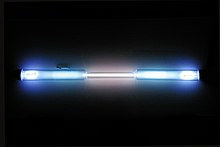Kripton
Kripton (saking Ancient Greek: κρυπτός, romanized: kryptos 'sané mengkeb') silih tunggil datu kimia antuk simbol Kr dan wilangan atom 36. Punika gas mulia tan pawarna, tan paambu, miwah tan parasa sané terdapat di akéh duluh ring atmospir miwah ketah kaanggén sareng gas mulia tiosan sajeroning sundih fluorésén.
 Satunggil tabung debit madaging kripton masunar putih | |||||||||||||||||||||||||||||||||||||||||||||||||||||||||
| Kripton kripton· | |||||||||||||||||||||||||||||||||||||||||||||||||||||||||
|---|---|---|---|---|---|---|---|---|---|---|---|---|---|---|---|---|---|---|---|---|---|---|---|---|---|---|---|---|---|---|---|---|---|---|---|---|---|---|---|---|---|---|---|---|---|---|---|---|---|---|---|---|---|---|---|---|---|
| Pabaosan | /ˈkrɪptɒn/ | ||||||||||||||||||||||||||||||||||||||||||||||||||||||||
| Cingakan | gas tanpa warna, masunar petak ring médan listrik | ||||||||||||||||||||||||||||||||||||||||||||||||||||||||
| Bobot atom standar Ar, std(Kr) | 83.798(2)[1] | ||||||||||||||||||||||||||||||||||||||||||||||||||||||||
| Kripton ring tabél périodik | |||||||||||||||||||||||||||||||||||||||||||||||||||||||||
| |||||||||||||||||||||||||||||||||||||||||||||||||||||||||
| Wilangan atom (Z) | 36 | ||||||||||||||||||||||||||||||||||||||||||||||||||||||||
| Watek | golongan 18 (gas mulia) | ||||||||||||||||||||||||||||||||||||||||||||||||||||||||
| Période | période 4 | ||||||||||||||||||||||||||||||||||||||||||||||||||||||||
| Blok | blok-p | ||||||||||||||||||||||||||||||||||||||||||||||||||||||||
| Konpigurasi éléktron | [Ar] 3d10 4s2 4p6 | ||||||||||||||||||||||||||||||||||||||||||||||||||||||||
| Éléktron per kulit | 2, 8, 18, 8 | ||||||||||||||||||||||||||||||||||||||||||||||||||||||||
| Cecirén pisik | |||||||||||||||||||||||||||||||||||||||||||||||||||||||||
| Pase ring STP | gas | ||||||||||||||||||||||||||||||||||||||||||||||||||||||||
| Titik lebur | 115.78 K (−157.37 °C, −251.27 °F) | ||||||||||||||||||||||||||||||||||||||||||||||||||||||||
| Titik didih | 119.93 K (−153.415 °C, −244.147 °F) | ||||||||||||||||||||||||||||||||||||||||||||||||||||||||
| Kapadetan (ring STP) | 3.749 g/L | ||||||||||||||||||||||||||||||||||||||||||||||||||||||||
| ri kala éncéh (ring t.d.) | 2.413 g/cm3[2] | ||||||||||||||||||||||||||||||||||||||||||||||||||||||||
| Titik tripel | 115.775 K, 73.53 kPa[3][4] | ||||||||||||||||||||||||||||||||||||||||||||||||||||||||
| Titik kritis | 209.48 K, 5.525 MPa[4] | ||||||||||||||||||||||||||||||||||||||||||||||||||||||||
| Panes fusi | 1.64 kJ/mol | ||||||||||||||||||||||||||||||||||||||||||||||||||||||||
| Panes panguapan | 9.08 kJ/mol | ||||||||||||||||||||||||||||||||||||||||||||||||||||||||
| Kapasitas panes molar | 20.95[5] J/(mol·K) | ||||||||||||||||||||||||||||||||||||||||||||||||||||||||
Tekanan uap
| |||||||||||||||||||||||||||||||||||||||||||||||||||||||||
| Cecirén atom | |||||||||||||||||||||||||||||||||||||||||||||||||||||||||
| Paindikan oksidasi | 0, +1, +2 (kapah langkung saking 0; asam oksida tan kauningin) | ||||||||||||||||||||||||||||||||||||||||||||||||||||||||
| Kaéléktronégatipan | skala Pauling: 3.00 | ||||||||||||||||||||||||||||||||||||||||||||||||||||||||
| Wasa ionisasi |
| ||||||||||||||||||||||||||||||||||||||||||||||||||||||||
| Jeriji kovalén | 116±4 pm | ||||||||||||||||||||||||||||||||||||||||||||||||||||||||
| Jeriji Van der Waals | 202 pm | ||||||||||||||||||||||||||||||||||||||||||||||||||||||||
| Cecirén liyanan | |||||||||||||||||||||||||||||||||||||||||||||||||||||||||
| Rupa alami | primordial | ||||||||||||||||||||||||||||||||||||||||||||||||||||||||
| Struktur kristal | kubus mapusat muka (fcc) | ||||||||||||||||||||||||||||||||||||||||||||||||||||||||
| Kagelisan swara | (gas, 20 °C) 221 m·s−1 (liquid) 1120 m/s | ||||||||||||||||||||||||||||||||||||||||||||||||||||||||
| Konduktivitas térmal | 9.43×10−3 W/(m⋅K) | ||||||||||||||||||||||||||||||||||||||||||||||||||||||||
| bacakan magnétik | diamagnétik[6] | ||||||||||||||||||||||||||||||||||||||||||||||||||||||||
| Karentanan magnétik molar | −28.8×10−6 cm3/mol (298 K)[7] | ||||||||||||||||||||||||||||||||||||||||||||||||||||||||
| Nomor CAS | 7439-90-9 | ||||||||||||||||||||||||||||||||||||||||||||||||||||||||
| Lelintihan | |||||||||||||||||||||||||||||||||||||||||||||||||||||||||
| Panemuan miwah isolasi kapertama | William Ramsay miwah Morris Travers (1898) | ||||||||||||||||||||||||||||||||||||||||||||||||||||||||
| Isotop utama kripton | |||||||||||||||||||||||||||||||||||||||||||||||||||||||||
| |||||||||||||||||||||||||||||||||||||||||||||||||||||||||
Pustaka
uah- ↑ Méija, Juris; et al. (2016). "Atomic weights of the elements 2013 (IUPAC Technical Report)". Pure and Applied Chemistry. 88 (3): 265–91. doi:10.1515/pac-2015-0305.
- ↑ Krypton. encyclopedia.airliquide.com
- ↑ "Section 4, Properties of the Elements and Inorganic Compounds; Melting, boiling, triple, and critical temperatures of the elements". CRC Handbook of Chemistry and Physics (édisi ka-85th). Boca Raton, Florida: CRC Press. 2005.
- ↑ 4,0 4,1 Haynes, William M., ed. (2011). CRC Handbook of Chemistry and Physics (édisi ka-92nd). Boca Raton, FL: CRC Press. p. 4.121. ISBN 1439855110.
- ↑ Shuen-Chen Hwang, Robert D. Lein, Daniel A. Morgan (2005). "Noble Gases". Kirk Othmer Encyclopedia of Chemical Technology. Wiley. pp. 343–383. doi:10.1002/0471238961.0701190508230114.a01.
- ↑ Magnetic susceptibility of the elements and inorganic compounds, in Lide, D. R., ed. (2005). CRC Handbook of Chemistry and Physics (édisi ka-86th). Boca Raton (FL): CRC Press. ISBN 0-8493-0486-5.
- ↑ Weast, Robert (1984). CRC, Handbook of Chemistry and Physics. Boca Raton, Florida: Chemical Rubber Company Publishing. pp. E110. ISBN 0-8493-0464-4.
- ↑ Patrignani, C.; et al. (Particle Data Group) (2016). "Review of Particle Physics". Chinese Physics C. 40 (10): 100001. Bibcode:2016ChPhC..40j0001P. doi:10.1088/1674-1137/40/10/100001. See p. 768

